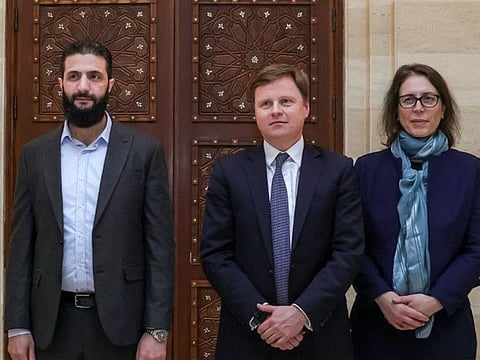Syria’s new rulers step up engagement with the world
EU to ‘step up direct engagement’ with Syria leaders: Von der Leyen

DAMASCUS: Syria’s new rulers stepped up engagement on Tuesday with countries that deemed ousted president Bashar Al Assad a pariah, with the French flag raised at the embassy for the first time in over a decade.
Al Assad fled Syria just over a week ago, as his forces abandoned tanks and other equipment in the face of a lightning offensive spearheaded by the Islamist Hayat Tahrir Al Sham (HTS).
Turkey and Qatar, which backed the anti-Al Assad opposition, have reopened embassies in Damascus, while US and British officials have launched communications with Syria’s new leaders.
France, a key early backer of the uprising, sent a delegation to Damascus on Tuesday, with special envoy Jean-Francois Guillaume saying his country was preparing to stand with Syrians during the transitional period.
An AFP journalist saw the French flag raised in the embassy’s entrance hall for the first time since the mission was shuttered in 2012.
After meeting Syria’s new leaders, the United Nations humanitarian chief Tom Fletcher said on Tuesday he was “encouraged”, and that there was a “basis for ambitious scaling-up of vital humanitarian support”.
German diplomats were also in Damascus on Tuesday, where they will hold talks that will focus on “an inclusive transition process in Syria and the protection of minorities” as well as “the possibilities for a diplomatic presence”.
Abu Mohammed Al Jolani, who heads HTS, stressed the need in a meeting with a delegation of British diplomats to end “all sanctions imposed on Syria so that Syrian refugees can return to their country”.
He also said Syria’s rebel factions will be “disbanded and the fighters trained to join the ranks of the defence ministry”.
“All will be subject to the law,” he added, according to posts on the group’s Telegram channel.
“Syria must remain united,” he said. “There must be a social contract between the state and all religions to guarantee social justice”.
Fears over Daesh resurgence
The EU’s top diplomat Kaja Kallas said the lifting of sanctions and removing HTS from its blacklist would depend on “when we see positive steps, not the words, but actual steps and deeds from the new leadership”.
in Ankara, European Commission President Ursula Von der Leyen said Brussels would intensify its “direct engagement” with Syria’s new Islamist-led rulers after the overthrow of Bashar al-Assad.
She also warned against a resurgence of Daesh group extremists in Syria, saying it “must not” be allowed to happen.
Speaking after talks with President Recep Tayyip Erdogan, whose government is in constant dialogue with HTS, she said the EU would increase its own contact with the group.
“Now we have to step up and continue our direct engagement with HTS and other factions,” she said.
European countries are wrestling with their approach to HTS which is rooted in the Syrian branch of Al Qaida and has been largely been seen in the West as a terror group, despite moderating its rhetoric.
In Ankara, Von der Leyen also warned Daesh militants could reemerge in Syria.
“The risk of a Daesh resurgence... is real. We cannot let this happen,” she said, using an Arabic acronym for Isis.
Sign up for the Daily Briefing
Get the latest news and updates straight to your inbox



